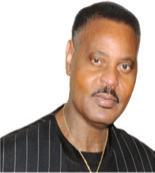








By: Sharon C. Jenkins
African American holiday traditions are a vibrant tapestry of history, resilience, and cultural pride. ese celebrations not only commemorate signicant events and gures in African American history but also serve as a means to preserve and pass down cultural heritage. Among these observances, Kwanzaa stands out as a relatively new tradition that has quickly become an integral part of African American holiday celebrations. Observed from
December 26 to January 1, Kwanzaa was created in 1966 by Dr. Maulana Karenga. Rooted in African harvest festivals, it focuses on seven core principles: Umoja (Unity), Kujichagulia (Self-Determination), Ujima (Collective Work and Responsibility), Ujamaa (Cooperative Economics), Nia (Purpose), Kuumba (Creativity), and Imani (Faith). Each day is dedicated to one principle, with families lighting candles on the Heritage on pg. 3
We the People Success is to be measured not so much by the position that one has reached in life, as by the obstacles which he has overcome while trying to succeed
- Booker T. Washington

By: Chloé Richards
Houston is facing a growing homelessness crisis, with over 3,200 people experiencing homelessness in Harris, Fort Bend, and Montgomery counties. In response, the city has launched a $70 million plan aimed at addressing the problem. e initiative includes nancial support from Harris County, philanthropic organizations, and government entities, with a clear goal to tackle the immediate needs of the homeless population by providing housing, mental health services, and safety.
Homelessness on pg. 6

Bobby Mills, Ph.D.




America, Jesus quoted this scripture from the Old Testament when the devil tried to tempt him into arti cially turning stones into bread (Matthew 4: 4). Jesus had the power to do so, but the moral lesson in the story is this: just because you can do something, it does not mean that it is the right thing to do. e spiritual-moral of Jesus’s encounter with the devil is




that we should never forget the Word of God, and this is why Jesus’s reply to the devil was: “man doth not live by bread only, but by every word that proceedeth out of the mouth of the Lord doth man live.”
(Deuteronomy 8: 3). In the twenty- rst century, we have too many materialistic minded Americans seeking to live by bread alone. For example, Donald J. Trump told Americans that he would bring down the prices of bread, eggs, milk if only they would elect him, President. Today (December 12, 2024) President-elect Trump brazenly stated that it is going to be hard to bring down food prices. Talk is cheap, lying is easy, and work is hard. Hard work, working by the sweat of one’s brow is
our eternal punishment for disobedience in the Garden of Eden. America, bringing down the price of food items is going to be hard, because the federal government does not own or control the means of production, and the distribution of food items to supermarkets. Surprise! Lying creates confusion. Consequently, America because of lying has become a ball of confusion based upon a dog-eat-dog mentality. What an ungodly shame, because living on physical bread alone leaves individuals spiritually empty and ultimately dissatis ed with life. e Bible always contrasts the wicked person with the righteous person. erefore, individuals should always: “Trust in the Lord, and do
good; so shalt thou dwell in the land, and verily thou shalt be fed.” (Psalm 37: 3). is is why Jesus called himself the Bread of Life, and if individuals eat of his spiritual teachings, they shall want no more. Moreover, King David was a man a er God’s own heart and he boldly declared: “I have been young, and now am old; yet have I not seen the righteous forsaken, nor his seed begging bread.” (Psalm 37: 25).
Twenty- rst century America is characterized by an insatiable desire to acquire materialistic things. Consequently, far too many Americans have thingi ed themselves as well as their interpersonal relationships with others. e acquisition Spiritualism on pg. 4

“We Africans in America have been socially engineered to reject our past, and far too many of us live in a state of suspended animation. We deny the historical realities confronting us daily. Too many of us mistakenly believe that the past has no bearing on the present and is unrelated to the future. Thus, we have been conditioned to live our lives disconnected from cultural values, principles, and ideals - essential for peaceful living.”
- Anthony T. Browder
kinara and discussing the day’s theme. e celebration culminates in a feast called Karamu Ya Imani on December 31st.
Another signi cant holiday is Juneteenth, celebrated on June 19th to commemorate the emancipation of enslaved African Americans. Originating in Galveston, Texas, in 1865, when Union Army General Gordon Granger enforced the Emancipation Proclamation, Juneteenth celebrations o en include parades, festivals, educational events, family gatherings, and readings of the Emancipation Proclamation. O cially recognized as a federal holiday in 2021, Juneteenth marks a vital milestone in acknowledging African American history and freedom.
Rosa Parks Day, observed on either February 4 or Decem-
ber 1, pays tribute to the civil rights activist whose de ance sparked the Montgomery Bus Boycott. is day is o en marked by educational programs, civil rights discussions, and community service initiatives. Rosa Parks’ courage remains a powerful symbol in the ght against racial segregation and discrimination. Similarly, Emancipation Day, celebrated on April 16, commemorates the signing of the Compensated Emancipation Act in 1862, which freed over 3,000 enslaved individuals in the District of Columbia. Celebrations include parades, historical reenactments, and educational workshops, particularly in Washington D.C., where the day holds special signi cance.
Harriet Tubman Day, observed on March 10, honors the life of the abolitionist who helped many escape slavery
through the Underground Railroad. is day is marked by museum exhibitions, educational programs, and community service projects. Harriet Tubman’s courage and determination inspire generations, symbolizing the power of individual action in the face of injustice. Similarly, Malcolm X Day, typically observed on May 19, celebrates the legacy of the in uential civil rights leader. Observances include lectures on Malcolm X’s philosophy, community discussions on civil rights issues, and lm screenings. His teachings on Black pride and self-reliance continue to resonate deeply within the community.
e birthday of Dr. Martin Luther King Jr., celebrated on the third Monday in January, is a federal holiday dedicated to the iconic civil rights leader. His advocacy for ra-
cial equality through nonviolent resistance le an indelible mark on American history.
e day is o en observed with community service projects, marches, interfaith services, and educational programs. It encourages Americans to volunteer, embodying Dr. King’s vision of a “Beloved Community.”
ese African American holiday traditions are powerful reminders of the struggles, triumphs, and ongoing journey toward equality. ey provide opportunities for re ection, education, and community building, allowing African Americans to celebrate their
rich heritage while passing down vital historical knowledge and values to future generations. As we continue navigating race relations in America, these holidays o er moments of unity, hope, and re ection, reminding us of the progress made and the work still ahead in building a just and equitable society. By participating in and learning about these traditions, all Americans can deepen their understanding of the African American experience and its crucial role in shaping the nation’s history and culture. is collective recognition moves us closer to realizing the dream of an inclusive America, where diversity is celebrated, and equality is a lived reality.





Taken from justiceatthegate.com
e Democratic Party is committed to support and advance the individual rights and liberties of all Americans. We will continue our e orts to eradicate discrimination based on race, religion, or national origin.

We will continue our e orts to eradicate discrimination based on race, religion, or national origin. We know this task requires action not just in one section of the nation but in all sections. It requires the cooperative e orts of individual citizens and action by state and local governments. . . . We are proud of the record of the Democratic Party in securing equality of treatment and opportunity in the nation’s armed forces, the Civil Service, and in all areas under federal jurisdiction. e Democratic Party pledges itself to continue its e ort to eliminate illegal discriminations of all (to be continued in the next issue).
We condemn bigots who inject class, racial, and religious prejudice into public and political matters. Bigotry is un- American and a danger to the Republic. e Republican Party will not mislead, exploit, or attempt to confuse minority groups for political purposes. All American citizens are entitled to full, impartial enforcement of federal laws relating to their civil rights. . . . We will prove our good faith by appointing quali ed persons, without distinction of race, religion, or national origin, to responsible positions in the government; † federal action toward the elimination of lynching; federal action toward the elimination of poll taxes as a prerequisite to voting; appropriate action to end segregation in the District of Columbia; [and] enacting federal legislation to further just and equitable treatment in the area of discriminatory employment practices.
We shall ever build anew, that our children and their children, without distinction because of race, creed, or color, may know the blessings of our free land. e Republican Party points to an impressive record of accomplish- (to be continued in the next issue).
and hoarding of things have become an ungodly lifestyle for too many individuals, not only in America, but in the world community. For example, King Assaad of Syria just like all other individuals can only drive one car at a time. Yet, Assaad had many high-end expensive luxury cars; until it was an abomination, and at the same time, (90%) of his subjects (Syrian citizens) experience food insecurity. Assaad owned a Ferrari F50, of which only 349 were built, and it is valued at 5.5 million dollars. What an ungodly shame. Sooner or later every individual
will experience his or her nal journey (death) and leave their material possessions behind for relatives and friends. King Assaad le many of his material possessions behind eeing to Russia, because his devilish kingdom was overthrown by Syrians seeking justice and decency. God told the Israelites you do not want a King, because you will regret the day. America, a word to the wise ought to be su cient, what was true for Israel is true in twenty- rst century America. Amen!
† Republican World War II hero Dwight D. Eisenhower became President in this election. Eisenhower determined to eliminate racial discrimination in all areas under his authority. He therefore issued executive orders halting segregation in the District of Columbia, the military, and federal agencies. Furthermore, he was the rst president to appoint a black American – Frederic Morrow – to an executive position on the White House sta .

By: Shelley McKinley
Honorable Dr. Carla Wyatt, the rst African American elected as the Harris County Treasurer, was voted into the position in November 2022, and began her duties on January 1, 2023. Rounding out her rst year of a four-year term, Dr. Wyatt put signi cant time into connecting with constituents across Harris County during 2024. “One of the things that has changed under my leadership is making more of an e ort connect with local residents. is is extremely important because tax payers should have an open line of communication with the individual responsible for moving money for Harris County,” shared Dr. Wyatt.
Self-described as “Carla like the hurricane, Wyatt like Earp,” Dr. Wyatt shared a laundry list of things she has accomplished this rst year; however, she is equally quick to share the credit with others. “We have successfully launched, with the help of the Commissioners Court and other departments, the ability to compensate individuals who report for jury duty via debit card or a hard copy check. is additional option gives individuals a choice in how they receive their compensation for completing their civic duties,” said Dr, Wyatt. Other accomplishments
include creating a foundation for nancial literacy education programs, savings and budgeting education, and sharing the importance of nances and mental health. Working with her teammates in the Treasurer’s O ce, Harris County residents may have noticed an uptick in personal visits to community centers, schools, libraries and even religious facilities in an e ort to encourage people to take an interest in what their dollars are funding. According to Dr. Wyatt, “Local government, public service, outreach and education, combined with heightened nancial awareness is my complete and total mission.”
Now that the Harris County Toll Road Authority (HCTRA) has taken over Tx-Tag account management, toll transaction processing, invoicing and payment collection, the expectation is that customers will avoid duplicate fees that they were previously experiencing. e move is also expected to increase e ciency and cut costs to keep tolls low for motorists. e
Treasurer’s O ce receives and deposits all monies received in the county’s depository bank. “As we take on the responsibility of the Tx-Tag accounts while working with HCTRA, we are hopeful that the launching of
theses services will also be one of the highlights of my service as County Treasurer,” asserted Dr. Wyatt enthusiastically. Dr. Wyatt has worked in various roles with Harris County since 2003. She established herself as a dedicated public servant within Harris County including working in the Harris County Budget O ce, Harris County Universal Services, Harris County Constable Precinct 3, and stepping up to run emergency communications during Hurricane Harvey.
Additionally, Dr. Wyatt cultivated her passion for community service by proudly serving numerous communitybased organizations such as the Houston Art Foundation Board, Scenic Houston Board, Houston Spark Park School Park Program Board, and the Clean Houston Commission. She is also a member of the Zeta Phi Beta Sorority Incorporated and Texas Southern University Alumni Association.
the professional and responsible accountability she believes they all deserve. She is the chief custodian of all Harris County funds. e
Treasurer’s O ce receives and deposits all monies received in the county’s depository bank.
e Treasurer is also responsible for disbursing county funds as directed by the Commissioners Court. e
Treasurer’s O ce maintains records of all funds deposited and withdrawn from the
county’s bank accounts. ey reconcile all county funds bank statements to ensure their accuracy and the safety of county funds.
In addition, the Dr. Wyatt submits a monthly report to Commissioners Court regarding the county’s nances.

Dr. Wyatt has a seat on the county’s Bail Bond Board, which regulates bail bond licenses, and the Treasurer’s o ce holds the required collateral. e Treasurer also sits on the county’s Investment and Audit Committees and may sit on AD HOC special project committees as needed.
As Treasurer, Dr. Carla Wyatt strives to leverage the many relationships she built during the span of her career to serve the people of Harris County with



During a press conference Mayor Whitmire described the approach as simple, saying, “It’s not rocket science,” but the reality of solving homelessness is more complex, as it is deeply tied to the city’s history of systemic racism and housing inequalities.
e city’s plan centers on a housingrst strategy, which prioritizes quickly providing stable housing for those in need. e mayor’s o ce and the Homeless Coalition are also focusing on expanding behavioral health services. One key challenge the city has long struggled with is the visibility of homelessness in public spaces like sidewalks, parks, and libraries.
“Allowing the homeless to be housed without preconditions like employment, sobriety, or other requirements is a great start to getting the homeless o of the streets, but there also needs to be plans to keep them o the streets” Rodriguez said.
According to Mike Nichols, former CEO of the Coalition for the Homeless, there is a need to “reclaim Houston’s public spaces,” ensuring they are accessible and safe for all residents. e city is also considering establishing a homeless authority to better coordinate e orts.
Kelly Young, CEO of the Coalition for the Homeless, emphasized the importance of acting quickly.
“Homelessness is a tragedy that has a
tragic end,” said Chief Larry Satterwhite of the Houston Police Department. e plan includes new rules, such as banning sleeping on the streets a er 9 PM, with the goal of reclaiming public spaces. “ ere needs to be some follow through on both sides of the plan, we know they are going to make it illegal for homeless people to consume public spaces past 9 PM but do we know that they are truly going to house them and give them adequate resources?” Rodriguez said.
However, the reality is that Houston’s homelessness crisis didn’t just appear out of nowhere. It is the result of decades of systemic racism and housing policies that have disproportionately impacted African American communities. In the 1930s, practices like redlining and urban renewal made it harder for Black families to secure housing and build wealth. Redlining is a discriminatory practice by banks and the federal government, marked Black neighborhoods as “hazardous” for investment, leading to a lack of loans and nancial opportunities for those living in these areas.
As urban renewal projects tore down homes and displaced thousands of Black families in the mid-20th century, neighborhoods like Freedmen’s Town, ird Ward, and Acres Homes were particularly a ected.
ese areas were once thriving communities, but the destruction of homes and businesses during these projects le many families without housing and led to the decline of these neighborhoods. e forced displacement pushed many people into poor housing conditions or out of the city altogether. Even today, gentri cation is forcing out longtime Black residents from areas like ird Ward, where the African American population dropped from 71% in 2010 to 45% in recent years. As new, more expensive developments replace older homes, many residents nd themselves priced out of their own neighborhoods, contributing to the growing numbers of people experiencing homelessness.
e city’s current plan includes a focus on behavioral health, recognizing that mental health challenges are o en a major factor in homelessness. Many people who are homeless struggle with conditions
like depression, anxiety, and substance use, which can make it even harder to nd stability. In the past, the deinstitutionalization of mental health care in the 1960s and 1970s le many people without proper care, and disproportionately a ected African Americans who were already vulnerable due to systemic racism. Without adequate mental health support and a ordable housing options, many individuals are le with no choice but to live on the streets.
e mayor’s plan also emphasizes a stronger relationship with law enforcement to ensure public spaces remain safe. However, focusing too much on enforcement may criminalize poverty without
o ering real solutions. e goal of the city’s plan is to ensure that everyone who falls into homelessness is “rehoused within 30 days” said Kelly Young, the CEO of the Homeless Coalition. If successful, this could provide much-needed relief to families and individuals caught in the cycle of homelessness. However, without addressing the root causes of homelessness such as lack of a ordable housing, mental health care, and the lingering e ects of historical racial discrimination this e ort may not be enough to break the cycle of displacement.
In earlier talks, Mayor Whitmire mentioned the idea of city-run homeless encampments to provide safe spaces for unhoused people. While the intention is to
help, the word “encampments” has restrictive and inhumane practices, like those used during Nazi Germany. Whitmire did not discuss the encampments in this press conference. e challenge for Houston is not only to provide temporary relief for the homeless population but also to address the historical factors that continue to shape the city’s housing crisis. Until systemic inequalities are addressed, the cycle of homelessness, displacement, and poverty will likely continue. e city’s $70 million plan is a good start, but the true test will be whether it can lead to lasting change both for the people currently homeless and for future generations who should never have to face the same hardships.


























































































